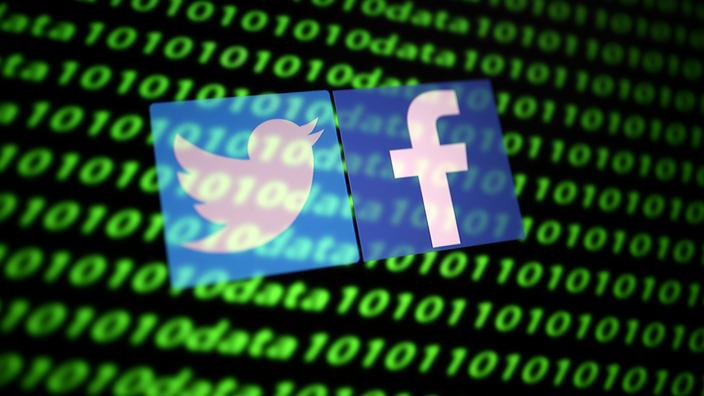In the wide range of themes addressed by the bill for the respect of the principles of the Republic, better known as the “
law against separatism
”, an entire chapter is devoted to the fight against online hatred.
The text that will be presented to the Assembly includes only two articles, one of which creates a new offense: that of knowingly revealing on the Internet information allowing to identify or locate a person in order to expose him to a risk. immediate harm to his life or to his physical or mental integrity.
The public authorities are considering the assassination of Samuel Paty, or the harassment suffered by high school student Mila.
An amendment tabled by the government wishes to significantly expand this chapter of the law, by overhauling the moderation and regulation of Facebook, Twitter or YouTube.
With no less than nine pages, it aims to revive the provisions of the Avia law against online hatred, but above all to adopt in anticipation certain measures resulting from a European regulation, the Digital Services Act (DSA).
The latter was presented in December by the European Commission and will not be put to the vote at best until the end of 2021. France wants to go quickly by now taking up certain main principles of the European text which intends to strengthen the fight against content illegal acts on the Internet.
Read also: Europe unveils its new rules of the game towards tech giants
Doesn't Paris risk drawing the wrath of Brussels by transposing a text that has not yet been discussed by the European Parliament?
"
The Commission will obviously be notified as required by European rules,
" explains Cédric O's cabinet. The subject has already been discussed between the government and Commissioners Margrethe Vestager and Thierry Breton, in charge of the DSA.
But the action of Paris is not necessarily appreciated by all.
"
If the French imagine that this will prevent the Parliament or the European Council from modifying the text of the Commission, they are mistaken,
" said a source within the Brussels institutions quoted by Politico.
Which platforms are targeted by the amendment?
The government's amendment concerns social networks and search engines, whether based in France or abroad.
Only those who exceed a certain audience threshold in France will be targeted, a threshold which will be set by decree.
These platforms will be subject to a long list of new obligations.
The objective is to better understand and supervise the moderation of illegal content, but also to optimize it.
What illegal content are we talking about?
The amendment cites the apology for crimes, war crimes, crimes against humanity and slavery, but also incitement to hatred against people because of their origins, religion, orientation sexual or disability.
Child pornography, terrorist content, pimping, sexual harassment and "
giving minors access to violent or pornographic messages
"
are also targeted
.
What will be the new obligations of social networks?
They are numerous and cover the entire chain of moderation of illegal content.
The networks will thus have to rewrite their general conditions of use to indicate the prohibited remarks and the penalties incurred by offending users.
They will also have to explain "
in clear and precise terms
" how their moderation services work.
Are they provided by employees, artificial intelligence, or both?
In this case, how is the work divided between humans and machines?
Reporting problematic content by users should be straightforward.
The platform must acknowledge receipt of the alert, and keep the author informed of the consequences of his report.
If the latter gives nothing, the user can appeal.
Internet users who multiply abusive reports may be sanctioned by the platform.
At the other end of the chain, the user who has one of their posts moderated should be informed, with a detailed decision.
The Internet user can, again, challenge the decision.
The amendment requires the networks to take sanctions proportionate to the seriousness of the acts.
“
The fact of suspending an account or, a fortiori, of terminating it, is indeed an act which undermines freedom of expression
”, explains the government.
“
It must necessarily be accompanied by clear, precise, transparent and questionable procedural guarantees.
"
The amendment also seeks to improve relations between platforms and judicial authorities.
The networks will have to appoint an employee based in France who will be the sole point of contact for the public authorities.
Who will check that the networks respect their obligations?
The load will return to the Superior council of audio-visual (CSA).
To carry out its mission, it will require the networks to submit regular activity reports which will be made public.
These platforms will also have to open wide the door to their backstage.
Transparency will be required on the operation of content moderation algorithms, so that the CSA can assess their effectiveness.
The regulator will also need to know the number of moderators allocated to France by each platform, and if necessary demand that their number be increased.
What will networks risk in the event of non-compliance with the law?
Two sanctions are foreseen.
The first concerns platforms that will not submit their reports to the CSA or that will lie about their data.
They will face a fine of up to 1% of their annual worldwide turnover.
The second sanction will target networks that do not seriously and repeatedly comply with their new obligations.
The fine will go up to 20 million euros or 6% of their worldwide turnover, whichever is higher.



/cloudfront-eu-central-1.images.arcpublishing.com/prisa/XV3RV6VB3NAOFNP4TMVZXPO6BQ.jpg)




/cloudfront-eu-central-1.images.arcpublishing.com/prisa/F4LSK2ELHJHY3O7CGPILY5EUMA.jpg)
